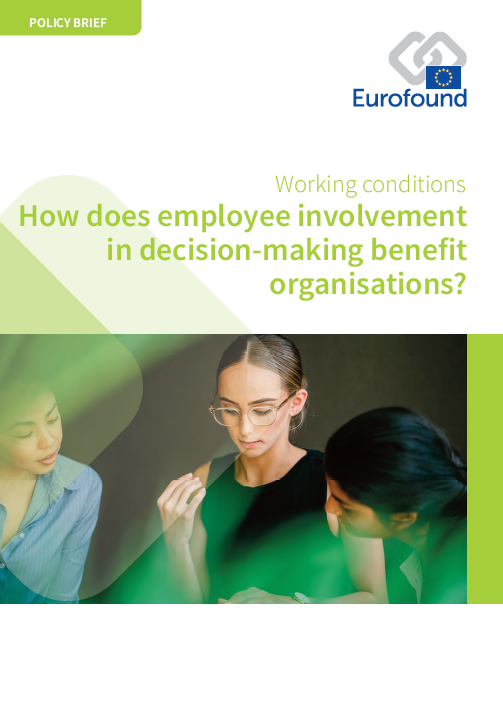
Comment les organisations obtiennent-elles le maximum de leurs salariés? Les recherches consacrées à la gestion des ressources humaines ont montré le rôle déterminant de la participation des salariés: il est important de permettre aux salariés de prendre des décisions sur leur propre travail et de contribuer au processus décisionnel en matière d’organisation. Un degré élevé de participation des salariés crée des environnements de travail hautement motivants, qui mettent l’accent sur le développement des compétences. Il s’agit du type d’environnement de travail dont les organisations ont besoin pour répondre aux exigences relatives à l’innovation et à l’adaptabilité au changement technologique dans une économie fondée sur la connaissance. Cette note d’orientation examine les données empiriques démontrant que les lieux de travail où la participation des salariés est élevée développent davantage l’aptitude de ces derniers à atteindre des performances élevées que les lieux de travail où les niveaux de participation sont plus faibles. Elle examine l’influence de l’organisation du travail sur deux facteurs contribuant aux performances: l’implication professionnelle et le développement des compétences.
Key findings
In total, 29% of employees in the EU, Norway and the United Kingdom work in forms of work organisation that provide a high level of employee involvement – meaning that employees are able to exercise their own initiative in carrying out tasks and have substantial input, either individually or collectively, in decisions that affect the wider organisation.
Nearly half of employees (47%) working in a high-involvement organisation report a high level of work engagement, almost double the share working in low-involvement organisations (24%). Highly engaged employees demonstrate a more positive orientation towards their work. They are less often absent from work, more likely to put in extra effort, prefer a later retirement age, and report higher levels of well-being.
High-involvement organisation provides more opportunity for both formal and informal skill development, but it is particularly strongly associated with informal skill development. This finding implies that high involvement is most likely to promote the practical expertise that underpins innovative thinking and to increase the capacity of organisations to adapt to changing technological and market environments.
High-involvement organisation has a levelling effect with respect to skill development. Differences in opportunities for skill development between high-skilled and lower-skilled employees are lower in high-involvement organisations.
These findings together suggest that it is particularly important to raise the decision-making latitude of less-skilled workers if employers are to optimise the performance of their workforce as a whole.
Graphs
- Figure 1: Types of work organisation and the proportion of employees who work in each, EU, Norway and the UK, 2015
- Figure 2: Percentage of employees in high- and low-involvement organisations, EU, Norway and the UK, 2015
- Figure 3: Levels of work intensity reported by employees in four organisation types (%)
- Figure 4: Levels of managerial fairness and supportiveness reported by employees in four organisation types (%)
- Figure 5: Levels of work engagement reported by employees in four organisation types (%)
- Figure 6: Effect of high involvement on work engagement by occupational category
- Figure 7: Employee scores on formal and informal skill development indices, by sector
- Figure 8: Employee scores on formal and informal skill development indices, by organisation type
- Figure 9: Factors accounting for occupational differences in informal skill development
- Number of pages
-
24
- Reference nº
-
EF19006
- ISBN
-
978-92-897-2085-4
- Catalogue nº
-
TJ-AR-20-003-FR-N
- DOI
-
10.2806/41377
- Permalink
Cite this publication
Eurofound (2020), Comment la participation des salariés au processus décisionnel bénéficie-t-elle aux organisations?, Enquête européenne sur les conditions de travail 2015, Office des publications de l’Union européenne, Luxembourg
